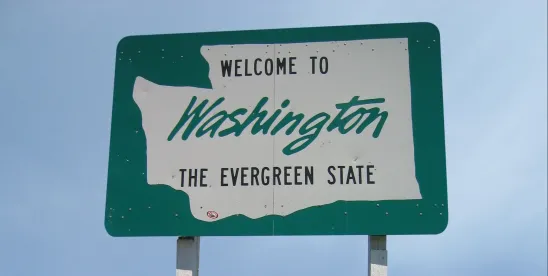Takeaways
- Several major new laws, from wage transparency and criminal background checks to expanded protections for vulnerable workers and more, keep Washington State in the forefront of progressive employment legislation.
- Employers should begin preparing now to ensure full compliance with these new laws that take effect in a concentrated three-month period starting in July 2025.
- Employers should also revise internal policies and training materials to reflect expanded anti-discrimination protections and new entitlements related to leave and personnel-file access.
Related link
Article
Washington State continues to lead in progressive employment legislation with a number of new laws set to take effect in the coming months. These changes span a wide range of employment issues — from wage transparency and personnel records to expanded protections for vulnerable workers. Below are some of the most significant bills by effective date.
Effective July 1, 2025
- Wage Equality and Anti-Discrimination - HB 1905 (2023-2024 Session) significantly expands the Washington Equal Pay and Opportunities Act by extending protections to a broader set of protected classes. Protected classes now include age, sex, marital status, sexual orientation, race, creed, color, national origin, citizenship or immigration status, veteran or military status, disability, and the use of service animals. Employers must ensure that compensation practices and workplace policies are free from discrimination across this expanded list.
- Immigration-Related Protections - SB 5104 prohibits employers from using immigration status to coerce employees regarding wage payment violations, conditions of labor, or agricultural labor requirements. This law reinforces protections for immigrant workers and aligns with broader federal and state anti-retaliation frameworks.
Effective July 27, 2025
- Personnel Records Access - HB 1308 mandates that employers provide current or former employees, or their designees, with copies of personnel files within 21 calendar days of a request, at no cost. It defines the types of documents covered. It also mandates that employers provide former employees a written reason for their discharge within 21 calendar days of a request. It provides remedies and penalties for violations.
- Paid Leave and Immigration Proceedings - HB 1875 allows employees to use accrued paid sick leave to prepare for or participate in immigration-related proceedings, including attending court hearings or consulting with legal counsel.
- Prevailing Wage Enforcement - HB 1821 expands the definition of “interested party” under prevailing wage laws to include joint labor-management cooperation committees and Taft-Hartley trusts. The new law allows greater access to an employer’s payroll records.
- Mass Layoffs and Business Closures - SB 5525 introduces new notice requirements for business closures and mass layoffs, effectively creating a state mini-WARN law. Employers must notify both the Employment Security Department and affected employees, or their representatives, in advance and in writing of a business closure and mass layoff. There are some differences between the new state law and the federal WARN Act, and employers must comply with both.
- Wage Transparency and Corrections - SB 5408 modifies the wage and salary disclosure requirement for job postings. Employers are given a five-day period to correct a potential violation before administrative action or private rights of action (including class actions) can be commenced. (This correction period is only available for two years, through July 27, 2027.) The modification clarifies liability for postings made by third parties without an employer’s consent. It also changes the damages available to plaintiffs in private rights of action.
- Job Postings and Driver’s Licenses - SB 5501 prohibits employers from requiring a valid driver’s license as a condition of employment or including a statement in a job posting that a driver’s license is required for the job, unless driving is an essential job function or related to a legitimate business purpose for the position.
- Unclaimed Property and Reimbursements - SB 5316 extends the abandonment period for employee reimbursements from one to three years. It also lowers the reporting threshold to $5 and the due diligence notification requirement to $50. The reimbursement provision takes effect July 27, 2025, and the reporting changes begin Jan. 1, 2026.
- Paid Family and Medical Leave for Dockworkers - SB 5191 adds employers of dockworkers who normally work for several employers in the same industry interchangeably through a collective bargaining agreement to the definition of “employer” for purposes of paid family and medical leave. The amendment clarifies that employer representatives in the dockworker industry are responsible for premium collection only for employees covered under a collective bargaining agreement. This addresses the unique employment structure of dockworkers.
- Collective Bargaining for Agricultural Cannabis Workers - HB 1141 grants agricultural cannabis workers the right to collectively bargain, addressing their exclusion from the National Labor Relations Act. Employers in the agricultural cannabis sector should prepare for potential unionization efforts.
- Customized Employment Training Program - SB 5682 modifies the distribution of state training program credits by county, based on participant data. This change may affect how employers access and benefit from workforce development incentives.
Effective Sept. 1, 2025 (and July 1, 2026)
- Transportation Network Companies (TNCs) - HB 1332 changes data transparency requirements for TNCs. By Sept. 1, 2025, companies must make available to drivers information on which vehicles (by make, model, and year) are eligible for each product class offered on their platform. Additional provisions that enhance driver access to earnings data take effect in July 2026, such as requiring companies to provide drivers, upon request, with access to aggregated, downloadable records of per-trip receipts in a searchable format.
* * *
With a wide range of employment-related laws taking effect in Washington between July and September 2025, employers should begin preparing now to ensure full compliance. This includes reviewing and updating hiring practices to align with new restrictions on criminal background checks and wage transparency requirements. Employers should also revise internal policies and training materials to reflect expanded anti-discrimination protections and new entitlements related to leave and personnel-file access. Taking these steps in advance will help organizations navigate the upcoming changes smoothly and reduce the risk of noncompliance.





 />i
/>i

